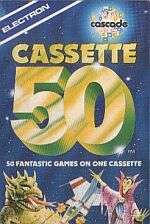Cassette 50
| Cassette 50 | |
|---|---|
 | |
| Developer(s) | Various |
| Publisher(s) | Cascade Games Ltd |
| Platform(s) | Acorn Electron, Amstrad CPC, Apple II, Atari 8-bit, BBC Micro, Commodore 64, Dragon 32, Oric 1, Oric Atmos, VIC-20, ZX81, ZX Spectrum |
| Release | 1983 |
| Genre(s) | Compilation |
| Mode(s) | Single-player |
Cassette 50 (released in Spain as Galaxy 50 - 50 Excitantes Juegos) is a compilation of games published by Cascade Games Ltd in 1983, and is an early example of shovelware - computer software marketed primarily on the basis of its sheer quantity rather than other factors such as quality or playability.
The compilation was advertised in home computer magazines, with buyers also receiving a Timex digital calculator watch with each purchase.
According to the instructions, "the games will provide many hours of entertainment for all the family at a fraction of the cost of other computer games".[1] The games were universally considered awful.[2]
In an interview, Matthew Lewis, the author of Galaxy Defence, said he wrote the game when he was 14 and submitted it in response to a small, anonymous ad in a local newspaper. He was paid £10 for his game, but he had to give up all rights to it. Galaxy Defence took 12 hours to code and the graphics were done by his father, Ernest Lewis.[3]
Content
The games featured differed depending on the platform.
Acorn Electron / Commodore 64 / ZX81
|
|
|
The games Exchange and The Force, although listed on the inlay, are missing from the Acorn Electron version, meaning only 48 games actually appeared on the cassette.
ZX Spectrum
|
|
|
|
The number with the '#' symbol represents the order in which the games appear on the tape.
'Star Trek' appears in the cassette booklet as 'Startrek', and 'Jet Mobile' appears as 'Jetmobile'.
Reception
The games, almost without exception written in BASIC, were deemed to be of poor quality. They have been described as "so bad it caused physical discomfort",[4] "beyond awful",[5] and "a piece of crap collection".[6] The poor quality of the games inspired the annual Crap Games Competitions (for example the comp.sys.sinclair Crap Games Competition[7] and the C64 Crap Game Compo[8]) and a now-defunct site reviewing bad games.[9]
See also
- Don't Buy This - Another infamous collection of poor ZX Spectrum titles (though it was purposely released by the publisher as a joke).
- Action 52 - A collection of 52 games on a single NES cartridge, in a similar spirit to Cassette 50 and with similarly poor reception.
- List of video games notable for negative reception
- Caltron 6 in 1 - A compilation of six games
References
- ↑ Cassette 50 inlay text
- ↑ Rewind Issue 1: Cassette 50 III Archived February 6, 2007, at the Wayback Machine.
- ↑ Cassette 50: the interview | pixeltron
- ↑ Rewind Issue 1: Cassette 50 III Archived February 6, 2007, at the Wayback Machine.
- ↑ Blitz 50 Archived April 1, 2007, at the Wayback Machine.
- ↑ TIGSource: Somewhere Beyond Cassette 50
- ↑ The CSS Crap Games Competition
- ↑ C64 Crap Game Compo 2005
- ↑ Collection of links to Internet Archive for now-defunct site Somewhere beyond Cassette 50
External links
- Cassette 50 at SpectrumComputing.co.uk
- Cassette 50 at MobyGames
- Cassette 50 ZX81 Collection entry with the original inlay scan and program listing. An emulator is available on the site to play the game online.